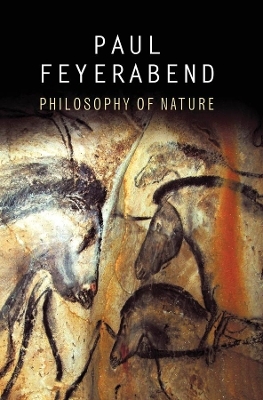
Philosophy of Nature
Polity Press (Verlag)
978-0-7456-5160-6 (ISBN)
- Titel z.Zt. nicht lieferbar
- Portofrei ab CHF 40
- Auch auf Rechnung
- Artikel merken
The book’s manuscript was long believed to have been lost. Recently, however, a typescript constituting the first volume of the project was unexpectedly discovered at the University of Konstanz. In this volume Feyerabend explores the significance of myths for the early period of natural philosophy, as well as the transition from Homer’s “aggregate universe” to Parmenides’ uniform ontology. He focuses on the rise of rationalism in Greek antiquity, which he considers a disastrous development, and the associated separation of man from nature. Thus Feyerabend explores the prehistory of science in his familiar polemical and extraordinarily learned manner.
The volume contains numerous pictures and drawings by Feyerabend himself. It also contains hitherto unpublished biographical material that will help to round up our overall image of one of the most influential radical philosophers of the twentieth century.
Paul Feyerabend (1924-1994) was Professor of Philosophy at the University of California, Berkeley.
Paul Feyerabend, an Historical Philosopher of Nature vii
Editorial Notes xxviii
Paul Feyerabend: Philosophy of Nature 1
Preliminary Note 3
1. Presuppositions of Myths, and the Knowledge of their Inventors 5
1.1. Stone Age Art and Knowledge of Nature 9
1.2. Megalithic Astronomy (Stonehenge) 15
1.3. Critique of Primitivist Interpretations of the Prehistoric Era 22
1.4. The Dynamic Worldview of Stone Age Humans 26
2. The Structure and Function of Myths 34
2.1. Theories of Myth 36
2.2. The Theory of Nature Myths and Structuralism 46
3. Homer’s Aggregate Universe 50
3.1. The Paratactic World of Archaic Art 51
3.2. Worldview and Knowledge in Homer’s Epics 65
3.3. Views of Reality and the Language of Science: Some Basic Considerations 77
4. Transition to an Explicitly Conceptual Approach to Nature 87
4.1. The New World of the Philosophers: Advantages and Disadvantages 91
4.2. Historical Factors for the Emergence of Philosophy 96
4.3. Predecessors in Hesiod’s and Oriental Cosmogonies 104
5. Philosophy of Nature through Parmenides 113
5.1. Hesiod and Anaximander: Changing Worldviews 114
5.2. Xenophanes: Critic of Religion and Epistemologist 134
5.3. Parmenides: The Origins of Western Philosophy of Nature 147
6. Western Philosophy of Nature from Aristotle to Bohr 158
6.1. Aristotle’s Research Program 159
6.2. Descartes: The Mathematical Approach to Nature 169
6.3. Galileo, Bacon, Agrippa: Empiricism without Foundations 173
6.4. Hegel: The Dynamics of Concepts 185
6.5. Newton, Leibniz, Mach: Problems of Mechanism 192
6.6. Einstein, Bohr, Bohm: Signs of a New Era 197
7. Conclusion 205
Paul Feyerabend: Previously Unpublished Documents 209
Letter to Jack J. C. Smart, December 1963 211
Preparation (Request for a Sabbatical, 1977) 220
Report on 1980 Sabbatical 232
Bibliography 235
Index 250
| Erscheinungsdatum | 18.09.2018 |
|---|---|
| Verlagsort | Oxford |
| Sprache | englisch |
| Maße | 152 x 226 mm |
| Gewicht | 408 g |
| Themenwelt | Geisteswissenschaften ► Philosophie ► Metaphysik / Ontologie |
| ISBN-10 | 0-7456-5160-7 / 0745651607 |
| ISBN-13 | 978-0-7456-5160-6 / 9780745651606 |
| Zustand | Neuware |
| Haben Sie eine Frage zum Produkt? |
aus dem Bereich


